
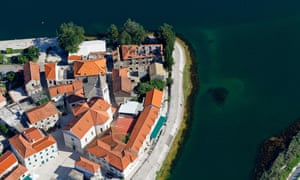
It’s 6pm on a Saturday in Opuzen, and I’ve just ordered my second £1 beer. Around me, the sunset is turning the off-white marble of the village’s church and houses a rosé pink. A group of men sit beneath an olive tree sliding drafts around a board, and a ginger cat twirls around a lamp-post.
I’m in Croatia’s Neretva valley and this small town a few kilometres from the coast is just 87km north of Dubrovnik and 144km south of Split, making it an easy drive from two of Croatia’s most popular destinations. But while Dubrovnik’s cobbles are packed with selfie-stick-wielding Game of Thrones fans, Hvar harbour is crammed with yachties and other islands throng with festivalgoers, this green and untamed chunk has remained relatively undiscovered.
Travelling in the Neretva is like going back 30 or so years, to when a trip to Croatia was the preserve of in-the-know holidaymakers. With a car it’s easy to nip between its tiny villages, vineyards and river swimming spots, but for the more adventurous, a tour with Explore Neretva, a new company set up by local Vedran Jurinovic, is a good way of getting to know the region.
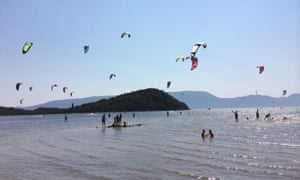
My three-day adventure with them starts with a kitesboarding lesson at Opuzensko Usce, one of the few sandy stretches of beach in Croatia. The breezy conditions at the mouth of the Neretva river make it an ideal spot for the sport.
If you don’t fancy the adrenaline rush of having a go, it’s fun to sit on the beach watching the kites while drinking beer at one of the simple beach bars. But to really see the Neretva valley, you do need to take to the water. Back upriver in Opuzen, I slide into a double kayak with Mladen, Vedran’s business partner.
“Fifty years ago all of this was a swamp,” he tells me as we dip our paddles into the vodka-clear river. Today, the sun-dappled tributaries weave through green wetlands filled with birds – there are more than 300 species here. After an hour of gentle paddling, passing just one person – a farmer with his dog – we reach pretty Kuti lake, at the foot of wooded hills: the water is calm, the silence blissful.
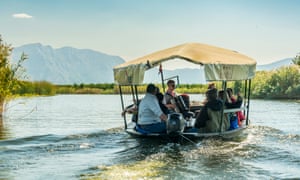
Pressing on beneath a pink sky, we arrive at Vedran’s remote waterside home for a feast of Neretva’s specialities: frogs. Followed by eels. We are eased in gently, with frogs caught hours earlier by Vedran’s dad, cooked in a light and crispy batter. His mum then proudly presents her stew – packed with tomatoes and eels as well as frogs. I recommend pairing it with višnjevac – the local cherry liqueur – and Terra Madre, a red wine produced on the rocky slopes of a new vineyard nearby.
Later, we jump in Vedran’s dad’s motorboat and head back towards Opuzen. We detour into more narrow tributaries, Vedran showing me fields of watermelons and nectarines, and tangerine trees with branches so low that locals harvest the fruit by boat. “We don’t see many tourists, but we had a very famous person come here on holiday here once,” Vedran tells me proudly. “His name was Boris. Boris Johnson.” Fortunately, it remains unspoilt.
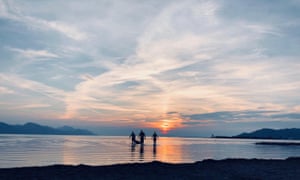
My home for the trip is on the coast near the Neretva’s mouth, in a basic but charming apartment in the tiny village of Blace. I take a dip in the sea from the concrete jetty, floating beside fishing boats and watch Lidtka, the apartment’s owner, delivering trays of giant cherries and wedges of watermelon from a nearby field.
Out of the water, the Neretva’s forested hills and endless fields are best explored by bicycle. Vedran takes me to a remote hilltop track from which we speed down deserted roads in an exhilarating and breezy blur of tiny churches, vast vineyards and fields full of donkeys. We finally pedal back into Opuzen, where low-key bars sit alongside brightly coloured street art, bougainvillea and Roman ruins.
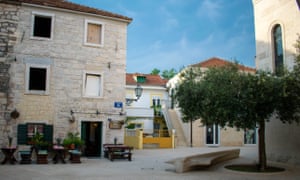
An ancient statue of the Empress Livia now takes prime position in front of the town’s bank, and others – all headless, for a reason no one can really explain – are now stashed in the nearby Narona Archaeological Museum, which sits directly on the site of a temple dedicated to Augustus.
Round the corner, Konoba Pod Maslinom is a family-run joint with gingham-clad tables beneath the soft-white stone of the town’s church. Our generous, non-stop feast includes moreish battered mussels, charcoal-coloured squid-ink risotto and a zesty octopus salad. Dessert is a shiny platter buckling under its load of plump nectarines.
Nearby, a group of older women are nattering on a bench. As they sit there, topping up their wine glasses, I wonder again how such a special part of the country remains so untouristy. “This is the real Croatia,” Vedran says as we clink glasses. And I have it all to myself.
The Guardian


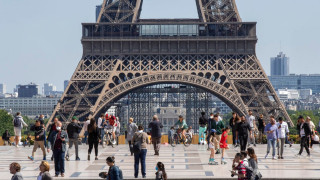








Leave a comment